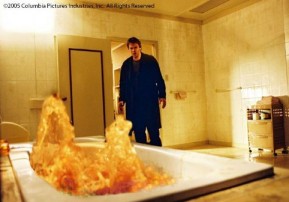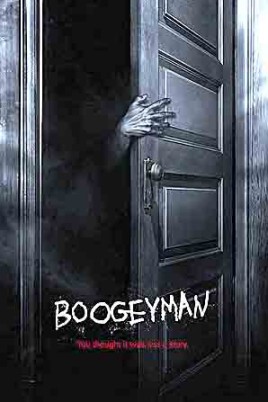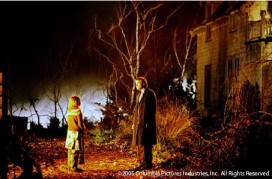|
Boogeyman
Boogeyman
is another one of those throwaway films that most avid filmgoers
will rightfully dismiss, and horror fans will find to be
too weak to really hold up as a frightfest. It has its moments,
but the film is never truly scary, unless you are frightened
by sudden jolts in the soundtrack accompanied by rapidly
cut sequences intended for shock effect.
No,
Boogeyman won’t keep you up at night, and
that would have been forgivable had it at least hit its
intended mark. It would seem that its aim was more in the
vein of the work of its Producers Robert Tapert and Sam
Raimi on the Evil Dead series. You know the feel,
an even mix of dark humor and frightening imagery? That
worked because the dosage of each was so expertly applied.
However, the second release under Tapert and Raimi’s
recently formed Ghost House Pictures is more or less underwhelming
in all regards. That is, until the film completely derails
somewhere in the middle of the second act, at which time
Director Stephen T. Kay seem to simply “let go”
and let the film have some truly wicked fun.
We open
the film in the world's most potentially terrifying room
ever, chock full of objects that seem to be placed strictly
because of their ability to look eerie in the dark. A life-like
model crow dangles from the ceiling, a pose-able human form
sits by a child’s bed on a dresser, an electric “eye
storm” sits across the room from the bed and the shutter-blinds
are designed to have a good half inch of clearance between
each blind, the better to aid the chiaroscuro of the mise
en scène.
The
hands of Production Designers Patricia Devereaux and Robert
Gillies are just a touch too visible for the tone here,
which had it been established as such, would have been pitch
perfect with the kind of sadistic torture Raimi and company
used to dish out on Bruce Campbell during his multiple stints
as Ash. Instead, it’s almost as if the film is just
afraid to go there. The “most terrifying bedroom in
all existence” belongs to Timmy, a five year old who
is obviously having a tough time getting to sleep in the
dark. He hears noises and a pile of clothes on his chair
appears to be moving when the lights are out.
 |
It takes
a minute or two to realize where Kay is going with this,
but once we finally reunite with Tim as an adult we start
to get a clearer picture that this is, in part, a joke.
After the altercation between a monster in his closet and
his father at age five, Tim has since grown into a walking
calamity that makes the film feel like a companion piece
to the Lemony Snicket series. He’s terrified
of closets, noises plague him in the dark, no matter where
he parks his car it happens to be the most desolate, run
down, and shadow-filled garage in all existence. His Thanksgiving
plans to meet his girlfriend's parents are cut short when
Tim is plagued by a dream of his ailing Mother. He awakes
to find himself cowering in the corner of the room, his
cell phone ringing off the hook. His uncle is on the other
end telling him his mother is dead and that he needs to
return home immediately for her burial.
All
of this to move Tim back home to the house that haunted
him as a child, where he lived in fear of a boogeyman in
his closet. We learn that Tim projected the trauma of his
Father abandoning his family with a simple resolution: “He
didn’t leave, the boogeyman took him.” This
is all good, good stuff, but it’s simply handled in
a terrible fashion. The fact that it took three screenwriters
to pull this story together should be a clue to its troubled
progression.
When
we finally (gasp!) reach the point of dealing with whether
or not there is an actual boogeyman haunting Tim, many may
feel too exhausted to give the best portion of the film
a chance. Tim finds himself lost in a labyrinthine maze
that twists together time and space in a fun kinetic fashion.
Alas, the fun ends too soon.
In the
end, its hard to recommend a film that takes so long to
get to something so promising, only to cut it short before
we’ve really had our fill. Yet there is one more saving
grace for Boogeyman. Throughout the delayed development,
the film seems to lead you in a direction that points to
yet another film with a twist revelation in the third act.
Instead, it dodges this recent trend and stays true to its
title's promise in the end.
Rating:

|








